Photo by Clár McWeeney
What advertising teaches us about periods
They are often sexist, strange, and silly, but advertisements for menstrual products are an important source of information about periods for many people. Advertising reaches huge audiences and has the power to spread stigma and shame around menstruation—or to inform and empower viewers.
The first print advertisements for sanitary aprons and belts appeared around 1920, promising discretion, convenience, and a solution to “an intimate feminine problem,” and many of the tropes used then are still common now.
Here’s a look at what period ads in the English-speaking world have been selling us, from the early 20th century up to the present day.
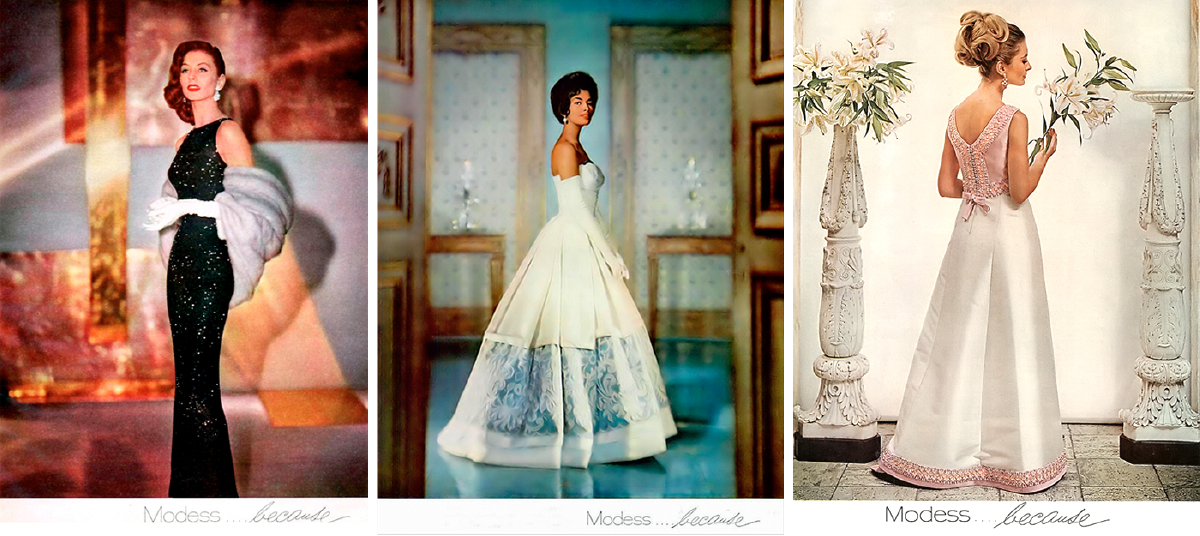
“Periods are unmentionable”
Modess was a brand created by Johnson & Johnson in 1926, which became a household name thanks to a glamorous advertising campaign they did in the US from the 1940s to the 1970s. The ads featured high fashion models, gorgeous gowns and the text: “Modess… Because.” There was no description of the product or what it was for. Periods were a taboo topic that was not directly spoken about, only alluded to. It took until 1985 for the word period to be said in a TV commercial by none other than Courtney Cox.
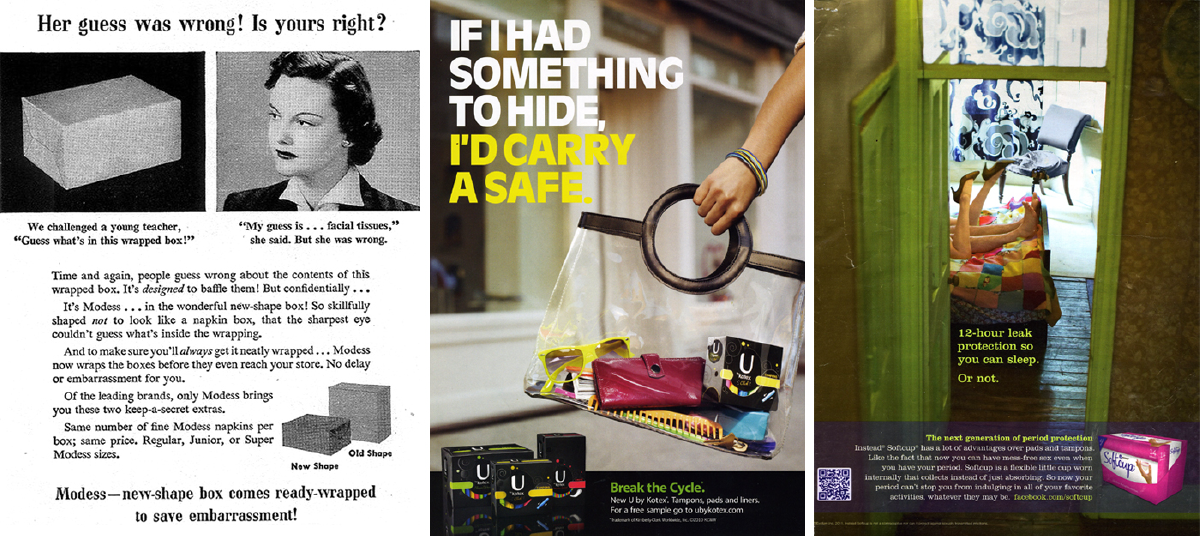
“Periods must be kept secret”
In the 1950s Modess promoted the fact that their sanitary napkins came in a plain brown paper box to save embarrassment.
Many brands still use terms like “virtually undetectable” or advertise that their product has a “discreet wrapper” to ensure “discreet protection.” This suggests it’s important to hide the fact you’re menstruating. In 2010, Kotex challenged period shame with their “Break the Cycle” campaign, showing that it’s cool to carry your tampons proudly in a transparent handbag.
At first the Softcup ad from 2015 above seems like it’s breaking taboos about period sex: the viewer can peek through an open door to see a couple in bed, with the text promoting “12-hour leak protection so you can sleep. Or not.” But the Softcup is actually designed to hide the fact you have your period, so you can go about your (sex) life “without him knowing.”
Friendly reminder: you can have sex during your period—some people even prefer it! There’s no need to hide the fact you are menstruating from your partner. Periods shouldn’t be a source of embarrassment.
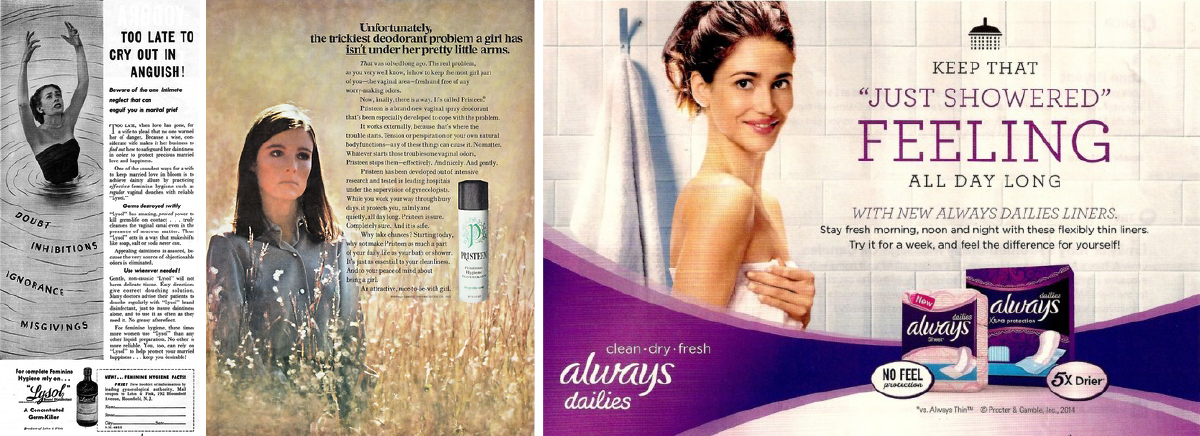
“Vaginas smell bad”
Menstruation has long been portrayed as a hygiene issue in advertising: the focus is on cleansing and deodorizing with the underlying message being that periods (and by extension, the people who have them) are dirty and smelly.
Your vagina is not dirty and there’s nothing wrong with the way it smells.
The vaginal deodorant industry is a prime example of manufacturers creating a problem so they can sell the solution.
Lysol is known today for making cleaning products, but their adverts from the early 1900s told women that their husbands would leave them unless they washed out their vaginas with poisonous chemicals—anything less would be “intimate neglect.” Andrea Tone wrote in her book Devices and Desires that by 1911 doctors had recorded 193 Lysol poisonings and five deaths from the product. Despite this, Lysol was aggressively marketed to women as safe and gentle. At this time contraception was expensive and difficult to access. Douching was cheap, accessible, and advertised as a feminine hygiene product, but it was also commonly used post-coitally as a form of birth control.
Unfortunately, douching as birth control doesn’t work. Tone’s book also refers to a 1933 study, where nearly half of the 507 women who used douching as a birth control method ended up pregnant.
Research has linked the practice of douching with increased risk of bacterial and yeast infections, pelvic inflammatory disease, cervical cancer, increased transmission of STIs, and other adverse health outcomes (1, 2).
Despite the fact we now have more information about the harms caused by douching, this practice persists. Nearly half the women surveyed in one 2008–2010 study had douched in the past month (3).
It appears that Lysol stopped advertising douching products around the time when the pill became available. Meanwhile advertisers continued to prey on insecurities about vaginal odor, selling the idea that you need their product in order to be fresh, clean, and sweet smelling. One 1969 ad for Pristeen deodorant for your “vaginal area” insists that you must spray your vulva daily if you want to be an an “attractive, nice-to-be with girl.” An Always ad from 2014 shows how the same message continues to be repeated now, inferring that if you can’t stay in the shower all day, you better use their panty liners.
A reminder: Most vaginal odors are normal and healthy, and douching does not prevent STIs or pregnancy — it can actually lead to vaginal infections that increase the risk of pelvic inflammatory disease, HIV, and other serious health problems.
If you have any concerns about vaginal odor or discharge please see your healthcare provider.
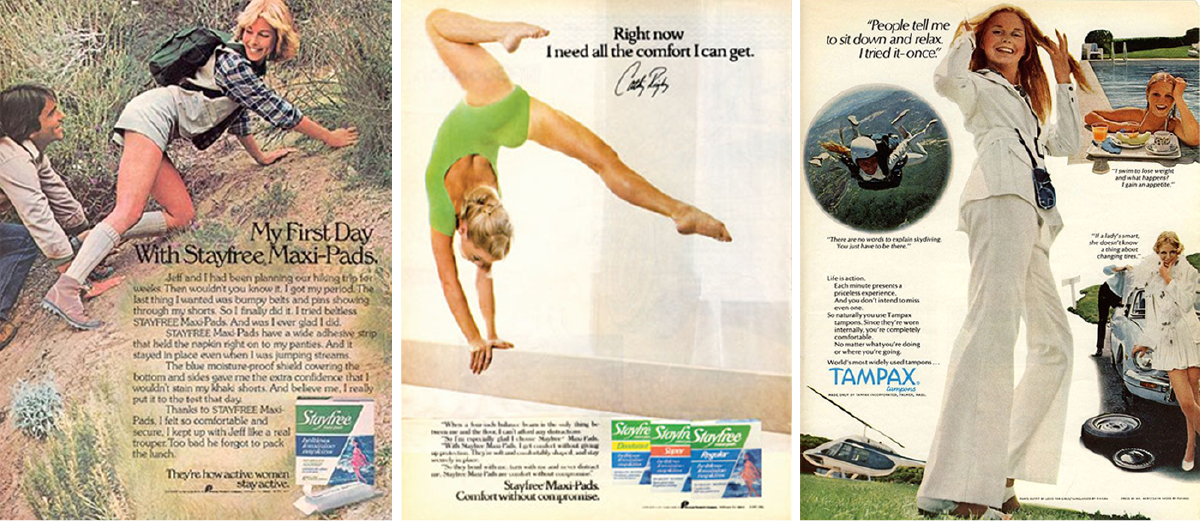
“Tampons and pads make you better at sports”
Along with white clothing to show you just how much the models trust their products, sports and adventure are a common trope in advertising for period products. It’s not really clear what skydiving, exercise, and changing flat tires has to do with your period, but many companies use images of happy, sporty, carefree women to sell their products.
The message that you can do anything during your period can be empowering, but can also be an affront if you experience severe pain or tiredness during menstruation.
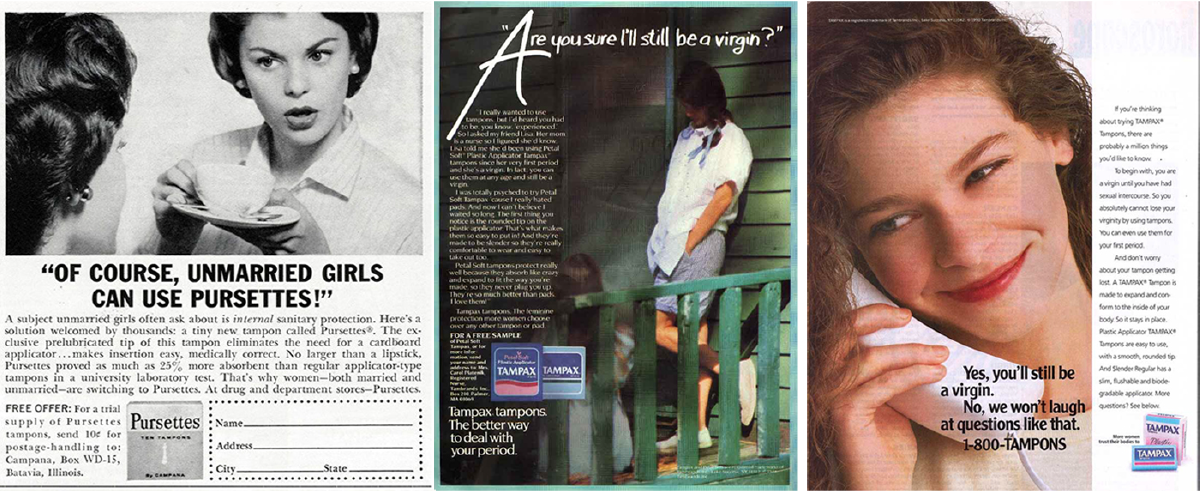
“Unmarried girls can use tampons too”
In the 1930s, tampon manufacturers were worried that unmarried women (who were generally thought to be virgins) would be reluctant to use tampons, which looked somewhat phallic and — most shockingly — penetrated the vagina. This was still a concern in the 1990s when these Tampax ads were published, brazenly using the word “virgin.” Throughout, the message is the same: You absolutely cannot lose your virginity by using tampons. This message is 100 percent true.
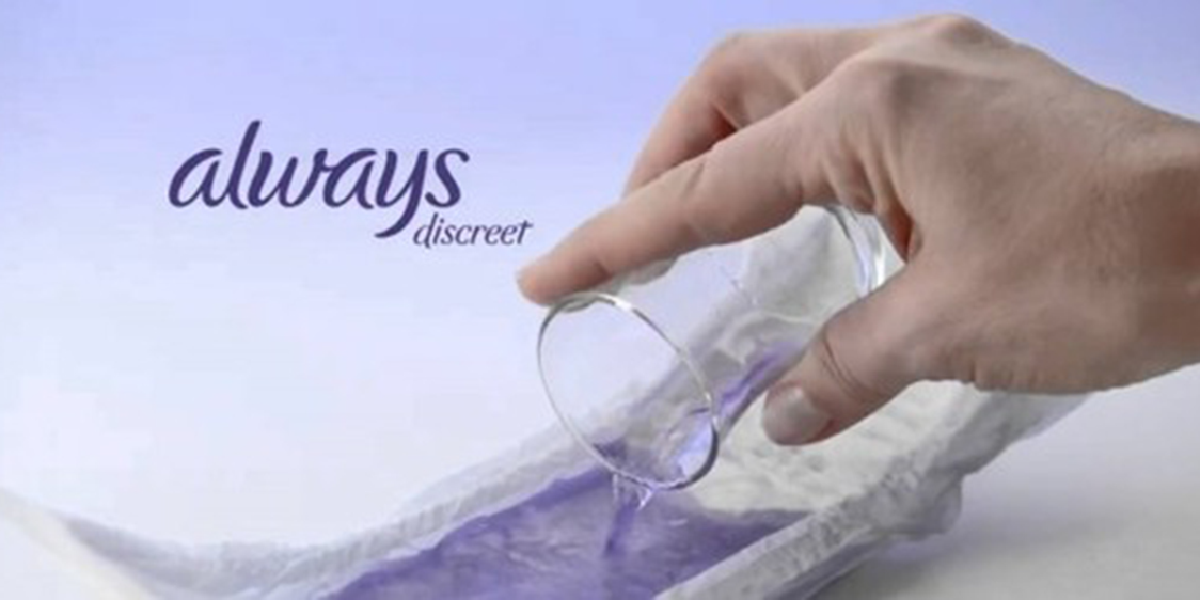
“Period blood is blue”
The ubiquitous blue liquid used in many ads sends confusing a message to young people about what periods are and what these products are for. It also suggests that period blood is too disgusting to show on TV, when blood is regularly shown in sports, medical dramas, and horror films.
In the 1990s, Libra created a fuss when they launched an ad featuring an apparent crime scene, with a woman mopping up a mysterious dark liquid with a pad. Bodyform then took things a step further in 2016 by releasing an ad depicting real blood — but not on a pad or tampon. It shows female athletes getting injured, picking themselves up, and carrying on, with the tagline “No blood should hold us back.” While definitely an improvement on all that flouncing around in white lycra of previous eras, it still sells the idea that we should push through pain and get on with life. If your period is blue, please see your healthcare provider.
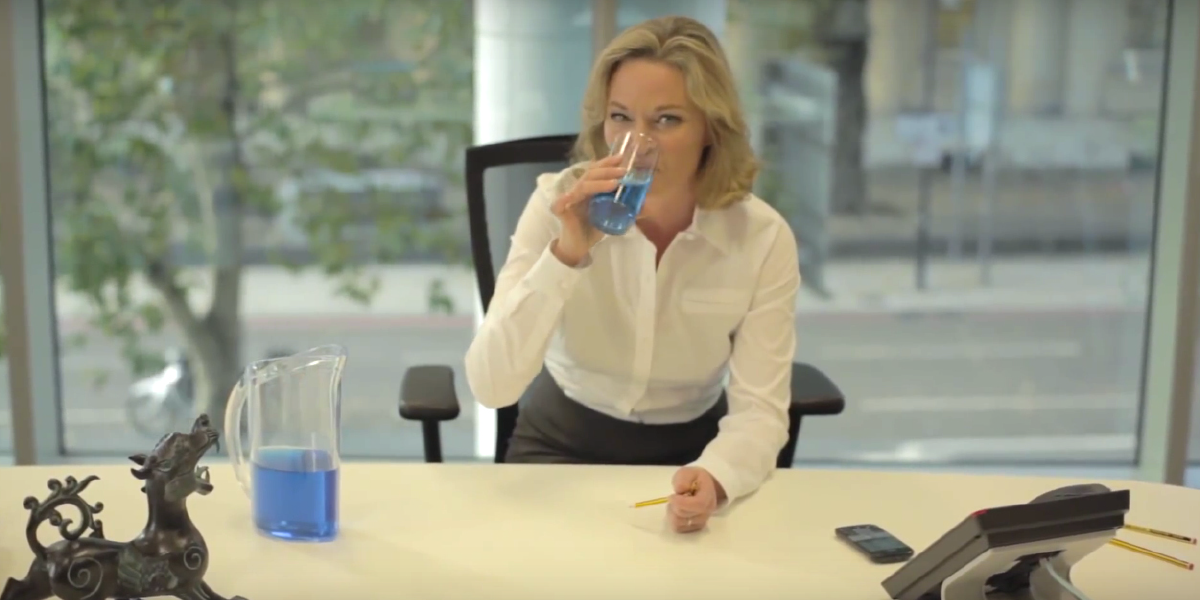
Bonus round: Period ads that joke about period ads
In 2010 Kotex ran two ads that made fun of their own “ridiculous” and “obnoxious” advertising. The first one features clips from vintage ads by the same company, and a sarcastic 20-something actress who remarks, “The ads on TV are really helpful, ’cause they use that blue liquid, and I’m like, Oh, that’s what’s supposed to happen.” The other advertisement seems to deconstruct itself, with a confident woman exclaiming, “Buy the same tampons I use, because I’m wearing white pants. And I have good hair. And you wish you could be me.” Next in 2012 it was Bodyform’s turn to come clean about misleading the public with their previous advertising, with a tongue-in-cheek reply to an unsatisfied viewer. Yes, she is drinking the blue liquid.
Tired of period euphemisms and metaphors? So are we.
Over the years, period-related advertising has improved, but there’s still a long way to go. A 2017 advert for the “Radiant Collection” by Tampax and Always is overflowing with white clothing and promises the quietest resealable wrapper (because heaven forbid someone hears that you have your period). At Clue we’re working to smash taboos around menstruation, and encourage people to speak openly about periods.
Menstruation is a normal and natural process which is nothing to be ashamed about.

